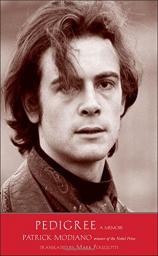Pedigree: A Memoir
Review
Pedigree: A Memoir
The knock on Patrick Modiano, winner of the 2014 Nobel Prize in Literature, is that he writes the same book over and over again, that he isn’t as great an artist as other authors because he restricts his focus to France in the years after World War II. That’s a little like saying that all Alice Munro ever does is write about small-town Canada, or that Philip Roth is too limited to think beyond Jewish people in New Jersey. Some authors are motivated by the need to bring order to their surroundings and their formative experiences. Modiano is that type of writer.
Which is what makes a book such as PEDIGREE all the more fascinating. PEDIGREE is a memoir that Modiano wrote in 2005, long after he had established himself as one of the most prominent authors in France. Much of his work has focused on the question of identity. Most of his protagonists resemble one another, and all, like Modiano, were born in 1945 and were deeply affected by the repercussions of France’s defeat during World War II and its subsequent collaborationist government. If you didn’t know it already, PEDIGREE, which Yale University Press is releasing in a new English translation by Mark Polizzotti, will make clear that many of the events Modiano has written about in his fiction were based on episodes from his life.
"[F]or all its reserve, much of the book surprises us with irresistible images... PEDIGREE is an excellent introduction to one of the more enigmatic Nobel laureates in recent years."
Modiano’s memoir covers his first 21 years, from his birth near the end of World War II to 1966, when his father, a man who “lived off the black market” and had many shady business “acquaintances,” writes to his son, “I am no longer responsible for you” and will provide no further assistance, “whether material or moral.” Modiano’s mother, born in Antwerp in 1918, was a chorus girl, appeared in Flemish film comedies, and, when Modiano is four, starts spending time in the company of a Russian playboy. Neither parent is particularly interested in nurturing Modiano and his younger brother, Rudy. “I can’t recall a single act of genuine warmth or protectiveness from her,” Modiano writes of his mother. “I’m a dog who pretends to have a pedigree. My mother and father didn’t belong to any particular milieu.”
The bulk of PEDIGREE chronicles the salient moments of Modiano’s early years: the boarding schools in which his parents enrolled him “to keep me away from Paris,” the books that influenced him, his parents’ actor friends and assorted lovers, and other unusual personages, including a friend’s grandmother who socialized with von Ribbentrop when Hitler’s Foreign Minister was still a champagne salesman.
It’s unfair to criticize Modiano for revisiting the themes that obsess him. A more legitimate criticism is that, based on the translations I’ve read, there’s often little variation in the way he describes them. In SUSPENDED SENTENCES, novellas he wrote between 1988 and 1993, he writes of a man “whose hair was so thick with pomade that it left stains on the couches and walls.” In PEDIGREE, written more than a dozen years later, he writes of a man named Stioppa, one of his father’s cronies, whose “hair was so thick with pomade that it left a stain when he rested his head against the sofa.” The Rue Lauriston gang --- Modiano’s term for the Carlingue, or French Gestapo --- appears in many of his works, with little change in his descriptions. PEDIGREE includes a reference to a mysterious photograph taken “in a nightclub near the Via Veneto,” much like the photograph that is central to 1978’s MISSING PERSON.
And readers who prefer passionate writing may object to the coolness of some of Modiano’s narrative choices. He tells us that, in 1957, 10-year-old Rudy dies and states further that, other than his brother’s death, nothing he writes here matters to him. But he mentions this death in only a couple of sentences, with no elaboration and with no more emotion than if he had described the weather.
Yet, for all its reserve, much of the book surprises us with irresistible images, as when young Modiano walks around in a trancelike state, "a mixture of giddiness and lethargy, like when you walk the streets in springtime after being up all night." When he is struck by a van, nuns put an ether-soaked rag on his head to calm him. Ever since, the smell of ether has reminded him of pain. PEDIGREE is an excellent introduction to one of the more enigmatic Nobel laureates in recent years.
Reviewed by Michael Magras on August 28, 2015
Pedigree: A Memoir
- Publication Date: August 25, 2015
- Genres: Nonfiction
- Hardcover: 144 pages
- Publisher: Yale University Press
- ISBN-10: 0300215339
- ISBN-13: 9780300215335




